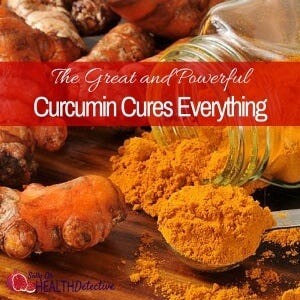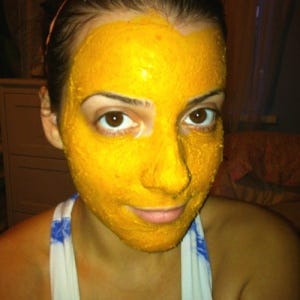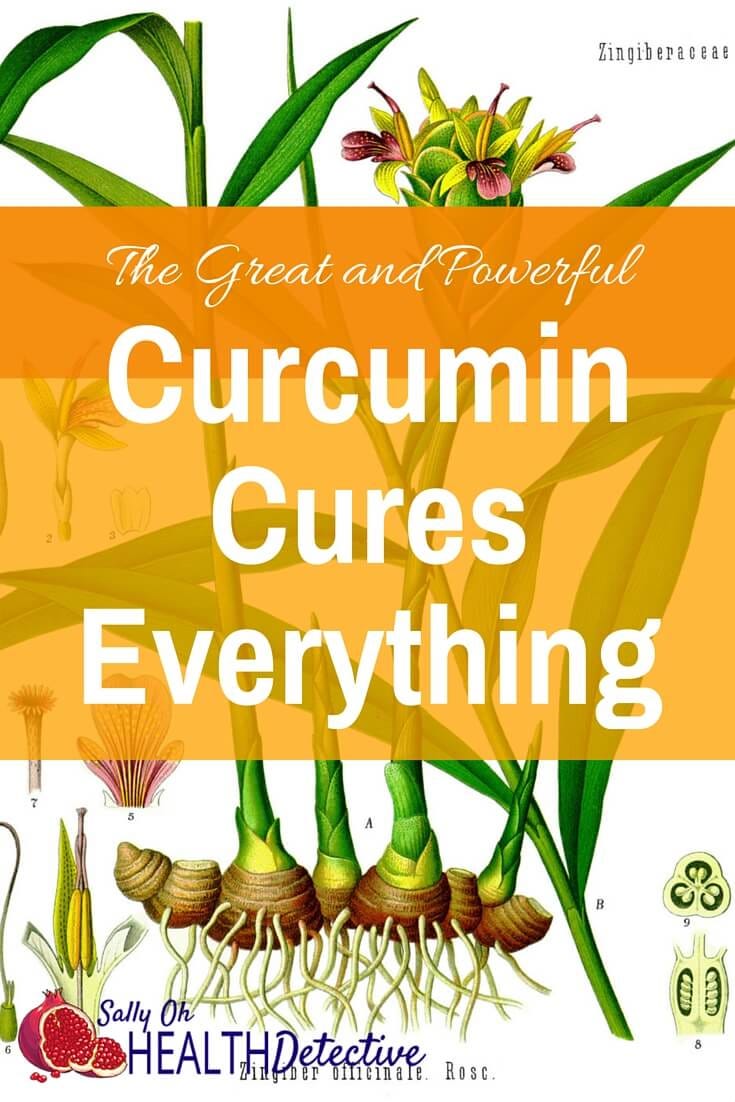The Great and Powerful Curcumin Cures Everything
It's actually pronounced KER-cue-men, but maybe we should call it CURE-koo-min? The research -- and there is TONS -- makes it sound like curcumin cures everything. If you wonder if it cures what you have, search "does curcumin cure _____?" After this foray into the world of curcumin, I'll bet it does and I'll bet you'll find PubMed studies that prove it.
Like this study related to GERD and this one on arthritis. Curcumin and diabetes, both 1 and 2! Or pop over to Green Med Info for tons of info.. The list goes on.
*Re. Alzheimer's: "Because of the lipophilic nature of curcumin, it crosses the blood brain barrier and binds to plaques."
These days, I'm suspicious when people rave about a substance that cures everything, like iodine or magnesium or IR saunas (all of which I take/do). Well, curcumin pretty much passes the "cures everything" test! I started researching for a client suffering joint pain and find its healing powers nothing short of amazing. I'd like to share with you what I've learned.
About Turmeric and Curcumin
Curcumin is the primary polyphenol in turmeric. Most people confuse these two and use the names interchangeably. Beware of this whenever reading about curcumin. Although turmeric has wondrous healing powers all on its own, writers may refer to the "healing powers of turmeric" when they might actually mean curcumin. Gets confusing and you have to dig to figure out what's what.
Curcumin is IN turmeric, a component of turmeric (one of 300+ components). They are not the same thing. Not only that, there is actually very little curcumin in turmeric (more on this below).
While turmeric is known as Indian saffron, it's the curcumin that produces the color. It's a pigment and stains almost everything, like beets do. In my searches, I stumbled across pictures of women using turmeric in a face mask. I didn't read the instructions, but I'm thinking, "Like a beet face mask? Um, no, I'm not doing that." At least... not yet.
Turmeric is produced from the root of a tropical plant, much like ginger. When we lived in Costa Rica, we bought both turmeric and ginger root fresh at the farmer's markets.
Curcumin's Healing Power
Researching health topics is my bag, so I think everybody is as excited at the thought of spending hours reading up on something as I am. Sometimes a client will ask, "Does this supplement/lifestyle modification work for this ailment?" In response, I send them two pages of links to read when they really just wanted a yes or no and maybe a bit of research to back up the answer. Gotta learn to pull in the reins on that, lol.
So you won't find pages of links here. But even if reading for a day on a topic is not your favorite way to relax, you want to know some of the backup for fantastic health claims, right? Happily, curcumin claims are easy to support: the actual science is everywhere. Here are a few of my favorite authorities:
Start with Margaret's curcumin cancer protocol - I LOVE Margaret's blog! She's a regular person (not a doctor or chemist) who developed smoldering myeloma in 2005, then researched natural protocols. She's still with us, has not done chemotherapy and credits curcumin with saving her. I had to drag myself away from her blog...
She got the protocol from Dr. Aggarwal, details here.
Natural News says curcumin is arguably the most potent anti-cancer nutrient in existence!
Linus Pauling Institute says yay to curcumin's healing power.
PubMed research is voluminous. Just the study titles make you want to run out and get some curcumin right now!
Sayer Ji is one of my favorite go-tos for info. Sayer has tons of articles on curcumin, like the one above on diabetes. Here's his broad overview on curcumin.
If you are a chemist and love that kinda talk, here's Margaret explaining all those mysterious curcumin codes.
Mainstream Cancer Treatment in development: injecting curcumin as a nanoparticle to attack cancer cells only, leaving the healthy and beneficial cells alone. Fantastic!
Dr. Kelly Brogan uses it for emotional health.
How to take Curcumin
You can supplement with curcumin pills/capsules, and/or cook with turmeric. We do both! This is the organic turmeric we use for cooking. This is the curcumin supplement we take.
POWDER?
You might wonder why we don't buy powdered curcumin and cook with that? That's because I couldn't find a quality powdered curcumin. The brands I found online raised my "too good to be true" flags. Cheap but not produced by companies that have earned my trust. One of the products is rumored to be derived via chemical synthesis so not from the actual plant.
Re. chemical synthesis: here are two articles, read in order: first article, 2nd article. Basically, yes, chemical synthesis is possible, but you need to trust the company doing the processing to make sure they include all the valuable curcumin pieces.
Since none of the powdered brands were Frontier, Southwest Organics or Azure Standard, my go-tos for quality spices and powders, I'll skip it. With such good supplements available and organic turmeric for cooking, why bother?
WHY NOT JUST EAT TURMERIC?
While curcumin is the main healing component of turmeric, there's not much curcumin in the root: only 136mg curcumin in 1 Tbsp of turmeric (source). Considering that:
Healing cancer and diabetes takes 7-10 grams of curcumin a day, and
Healing inflammation between 300-2000 mg curcumin a day (or more)...
... you'd be trying to eat between 3 and 60 Tbsp of turmeric every day! Not trying to run your life here, but you probably want to take curcumin supplements instead.
Still, even though it's nigh impossible to get enough curcumin to heal solely via food, Dr. Sukamar, cancer researcher at Johns Hopkins, says to cook with it as much as possible. She has seen improvement in her patients just eating turmeric. We're all in for that around here!
NOTE: According to this NutritionFacts.org video, those who are pregnant, have gallstones, or are susceptible to kidney stones may want to moderate their turmeric consumption.
Curcumin requires fat and pepper to be digestible.
Piperine (found in black pepper) increases the bioavailability of curcumin by 2000%, so if you're eating turmeric, you want to use pepper in the recipe.
You also want to use fat: turmeric is not water-soluble, it is fat-soluble. If you are eating/cooking with turmeric or taking a curcumin supplement that does not already include fats, then you need to eat those with a fat.
Curcumin Supplements
This is what we take.
This is the curcumin Margaret takes. Since she is curing cancer with curcumin, she takes 8 grams daily which is 16 pills of 500mg. Yes, it adds up. She takes the "atomic bomb" approach, meaning all 8 grams all at once, rather than spread throughout the day. She usually dissolves the capsule contents in melted dark chocolate with butter. Just for the fats, you know.
Re. BioPerine® in the supplements As mentioned above, curcumin is not naturally bioavailable, meaning it will not get into your bloodstream on its own. Most of it passes right through you. BioPerine® is a patented black pepper extract shown to enhance the absorption of curcumin.
There are a couple of newer processes that claim to deliver even more curcumin to the bloodstream. Three of the new supplements (BCM-95, Meriva and Longvida) are liposomal-like, meaning the molecules of curcumin are encased in fat which makes them more digestible. The fourth, Theracurmin, makes the curcumin molecules so tiny, they are water dispersible and pass through the intestinal wall.
Margaret tried a couple of other brands/processes during the 10 or so years she's been taking the curcumin cancer protocol and her test results were not good. She has gone back to her standard (the Doctor's Best) and her test results are stable again. Very unscientific for the rest of us, for sure, but her brand ain't broke. For the record, she has not tried Theracurmin and is considering it.
An Aside on Pepper and Curcumin
Pepper's role is to escort curcumin to the bloodstream... but is this necessary?
Stephanie Seneff of MIT says that curcumin should NOT necessarily be in the blood stream, that its main job is to deliver sulfate to the liver. She says getting curcumin out of the gut-liver pathway and into the bloodstream may actually prevent curcumin from doing its main job of delivering sulfate.
So... do I even want curcumin in my bloodstream? The evidence on the healing powers are compelling. Perhaps we want curcumin in the bloodstream sometimes to cure some stuff? IDK yet. So here's what we do at our house: we take Theracurmin, plus we cook with turmeric, not necessarily adding pepper. Covering the bases.
Does heat adversely affect curcumin?
I asked this after reading an article that said heat breaks down curcumin. The article was written back in 2000, though, and resources are no longer available. It made some sense to me that heat might break down a substance, so I set out after FAQs.
Some articles/experts say to add the spice only at the end of cooking so that not too much heat is applied. In fact, a fellow practitioner is taking a course in holistic cooking and was told this.
However, the majority of research and experts say heat is not a problem for curcumin.
Margaret says heat does not hurt and in fact increases bioavailability. (She said so here, too.)
This research agrees (see p6 for the bit about food).
And one last bit of curcumin info:
Store your turmeric and/or curcumin capsules in airtight containers in the dark. Curcumin is light and air sensitive and will lose potency when exposed to either.
So that's it: pretty much everything you need to know about how curcumin cures everything. At least, the basics, without overwhelming you with pages of links. Now, about that face mask... going back to read up on that, maybe give it a go. If I do, you know there will be pictures.
UPDATE NutritionFacts.org has a very interesting video on whether or not extracting curcumin and using that alone works as well as the whole plant turmeric spice. The "reductionist" theory -- that is that a LOT of one component of a plant, the "healing" component, works better than the whole plant -- is worthy of consideration. I'm generally a fan of whole plant medicine, like whole food medicine. However, for now, I'm sticking with curcumin supplements simply because so many people are getting so much benefit from it.
It has also come to my attention that Dr. Bharat Aggarwal, the world's leading researcher on curcumin and turmeric has been investigated for using some of the graphs in his reports to misrepresent his findings. Although there have been corrections to some reports (Aggarwal wrote 500 papers), his employer at the time, MD Anderson Cancer Center, is under no obligation to reveal the findings of its investigation. In lieu of hard facts, I'm again going with anecdotal.
Save
Save




